- Home
- Tim Winton
Eyrie Page 3
Eyrie Read online
Page 3
Hope you feel better, Keely said to the boy.
You too, said the kid.
The woman snorted and fished for something in her bag. She’d been pretty once. In her denim skirt and sleeveless top she seemed puffy, almost bruised. Her dirty-blonde hair was dry and she had the kippered complexion of the lifelong smoker, but any man would still look twice.
You look familiar, she said.
She seemed to be about his age. One of her front teeth was chipped and discoloured, as though it were dying.
Well, he said. Same floor, I guess. Like you said, neighbours.
Where are you again?
It occurred to him she was only being careful, that she suspected him of having followed them up from the street through the security door.
Ten-oh-seven, he said.
Huh, she murmured, taking the serious little boy’s hand. Don’t think I seen you here before. Know you from somewhere, but.
Keely tried to bring it to a close by setting off along the walkway. Well, he said over his shoulder – a little more abruptly than he intended – I keep to myself.
He heard her grunt; it could have meant anything. When he pulled up at his door he saw her strolling along hand in hand with the boy, no longer in quite such a hurry. She was making sure. Which said something about the way he looked, no doubt, so he made a performance of digging out his key like the hunter home from the hill and all. But he was running out of puff now, listing against the gritty bricks, and as he hauled back the security screen and shoved the key in the lock, he saw the kid surge ahead of the woman, dart towards the iron balustrade and mount the bottom rung with a suddenness that sent a spasm of apprehension through him. He fumbled the key, dropped it, but couldn’t stoop to pick it up with the kid perched there on tiptoe, right outside the door, two metres away. The child’s skinny arms were knitted over the iron rail, head suspended in a roasting updraught, hair ripped back like the tail of a comet. As if he were speeding, hurtling, falling already. Brutal silver rooftops, far below. Traffic noise. Playground cries. A ship’s horn signalling imminent departure. Keely didn’t dare take his eyes off him. Too stunned, at first. Terrified he’d startle him disastrously by moving, by lunging, calling out. And then, for two, three, four whole seconds he was convinced his steady gaze was vital, that he was the only force securing the kid to the building. Sneakered heels tipped up, laces snickering in the wind. Keely heard the woman, clocked the peripheral blur of her ambling. Could not believe she was so lax, so sanguine about the child being this close to the edge, ten storeys high with his feet off the mottled concrete. He just locked onto the slight frame with his last fading energy, growing angrier with every slow-moving moment, furious at both of them for being so careless and such a cruel interruption. Until the little boy’s throat began to work and he looked as if he were about to puke. And in the instant Keely tensed himself to spring, to haul him back to safety, when it seemed the kid would retch and lose his grip, the boy hawked and sent a shining gob of spit out into space. And then the woman was there, cuffing the back of his neck goodnaturedly.
Don’t spit, ya dirty bugger, she said. Some poor mug’ll think it’s rain.
One drop? said the kid.
That was a joke, ya knucklehead.
Was it funny?
Thanks a lot.
Keely subsided against his door. Like a badly wrapped parcel, a side of beef on the turn, wrappers sodden, every exposed patch of him livid and unwholesome. Christ, he reeked. He snatched up the key, fell through the door and left the pair of them bantering away as if he’d never been there.
Git down off that, said the woman. Carn, it’s hot.
Keely shut the door, pitched his pointless shopping onto the bench and lurched towards the bedroom. Fell to the mattress like a burning man into a swimming pool.
Thank God. Or whoever. Just, thank you. And in that first flush of deliverance Keely felt feverish relief. Before the blood rushed to his head and the ceiling blurred horribly, pressing down against his eyes, chest, tongue. Nothing for it but to lie there. Taking it. Giving it time to resolve. Willing the distorted sensation to back off enough for him to get his wits together, breathe easy again.
But there was a knock at the door.
Not now! he called.
The rapping continued. The fridge kicked in so hard he felt it in the neck. And a voice, like something through water. Burbling. Ramping up the pain. Every knock at the door was like a thudding heartbeat out of sync, needling through his teeth. For pity’s sake!
He got to his feet seeing double, slammed his hip against the kitchen bench heading for the door and was too consumed by all the competing sensations to even say anything when he reefed it open and saw them still there, backlit into fuzzy silhouettes on the other side of the insect screen.
Tommy Keely, she said.
He blinked. It was nasty, hearing his name uttered. Here in the building. Out in the open. Through his own screen door.
It took a while, she said. But I knew it was you.
Well, he croaked, congratulations. I guess.
It’s you, though, isn’t it? I’m right, aren’t I?
Maybe. Who cares?
Sorta bloody question’s that?
I dunno. I’m sorry. I’m. I dunno.
Keely sagged against the fridge a moment, his head ready to split like a melon. When he looked back, the boy was gone. The air outside danced with bubbles of light, camera flashes, a violet pulse.
You alright? she asked.
Yeah. Nah. Yeah.
You don’t remember?
Yes, he said. I remember who I am.
Not you, ya fuckwit. Me.
He stared at her through the flyscreen. Saw little more than the flaring nimbus around her head.
I’m sorry?
Blackboy Crescent, she said.
Shit. Really?
I thought you’d remember.
I remember Blackboy Crescent.
But not me.
It occurred to him that this was the point at which he was supposed to throw all caution aside and ask her in, but he’d lived too long in wary isolation. And already regretted admitting who he was. But Blackboy Crescent, that set him back. And where was the kid? What was she doing about the kid scampering some-where along the open gallery?
Your little boy, he rasped.
Watchin telly. Bloody scam-artist.
He tried to straighten up. He could feel her peering in. Feel her scoping out his entire ruined carcase.
Your sister’s name is Faith.
Okay, he said, pressing against the screen door for a closer look. The woman chuckled. He could not truly see her for turbulent, twitching lights.
Mate, you’re off your chops.
No. Headache.
Right, she said sceptically.
So, he said. So. So, how d’you know Faith?
Same way I know your mum’s Doris and your dad’s Neville.
He’s dead.
Oh. Jesus. Sorry. Fuck. I forgot.
Doesn’t matter.
You look different, she said. Maybe it’s the beard.
I guess so, he muttered, finding the thought distantly amusing, as if it could only be the whiskers that were rubbish and the rest of him was in showroom nick.
She stood there a few moments more in hazy outline. He thought he might fall. For a moment he wanted to be sick. No nausea, just the urge, which was a recent thing and perplexing. Yet he could still feel her disappointment, the sense of something curdling. Blackboy Crescent. The swamp, corrugated-iron canoes, tuart trees, yellow dirt, the engine-oil smell of his father.
Anyway, she murmured.
Right.
I’ll let you go before you fall over.
Okay.
It’s Gemma, by the way, in case you were actually wondering.
Gemma? Gemma Buck? Are you serious?
No, I’m bloody makin it up, what d’you think?
I’m, I —
And then she was gone.<
br />
The bed came halfway across the flat to meet him.
When he woke it was almost dark. The sea breeze rattled the blinds above his head and the building clanked and gurgled with showering, dinner-making, dishwashing. Weird the way coughs and cries and TV laughter travelled through the bones of the place. Outside, only gulls and the murmur of traffic, everything subdued, as if the fever of payday had broken.
He got up slowly, in stages. He was weak. His headache had retreated to the intensity of a mere hangover and this was as close to relief as he was likely to get. His vision was more or less back to normal.
As ever, somebody was cooking with old-style curry powder – Keen’s or Clive of India – the smell of church suppers, student digs. The junkies would be content, on the nod. And, having peaked early, the drunks sleeping it off at home, on the street, in custody. Everyone else treating themselves to a nice chop, a bit of spicy chook. All was well.
On the kitchen bench in a puddle, his bag of groceries. He slung it into the fridge and tried not to think of salmonella. Over by the sliding glass door there was no longer a visible stain on the carpet but when he walked across it he found the area still slightly damp underfoot. At least it didn’t stink.
He slid the door open and stepped out onto the balcony to feel the briny wind in his hair, his beard. Out over the sea the western sky was all fading afterglow. Beneath him, the melancholy lights of the wharves, warehouses, streets.
Blackboy Crescent. Gemma Buck.
A festive mob of pink and grey cockatoos settled on the date palms behind the cathedral. Galahs, he thought fondly, they were the backpackers of the skies – rowdy, rooting freeloaders, God love em. For a minute or two he watched them preen and dance for one another, and it was calming. Until the slider next door grated open and he retreated inside as someone stepped out to light a fag and hack up a lungful.
Now he was forced indoors, he thought he should eat. His appetite was all over the place. He felt hollow, so maybe food was the thing. Cooking a meal every night was about the only form of self-discipline he’d been able to maintain of late. Apart from keeping his head down. But tonight he was too spent and shook up to bother. He’d nuke the leftovers of yesterday’s stir-fry and make it up to himself tomorrow.
And while the bowl suffered bedspins inside the microwave, he tried to make sense of the Gemma thing. Couldn’t even come at the kid on the rail, that whole freaking thirty-second scene, no, not now he’d levelled out. The idea of her, though. Being outside his door, here in the building. That was already more than he could deal with without burning a circuit.
Gemma Buck. Not a girl at all, but a woman – and a pretty ordinary middle-aged woman at that. He couldn’t get to grips with it. For in his mind she was still a needy urchin with white-blonde plaits. Someone’s irritating little sister.
Inside the machine the bowl of food began to sweat and the flat filled with the earthy scents of shiitake and sesame oil. A reminder that he’d been functional up until the early evening last night, at least. Which didn’t quite warm the cockles, but he’d take it as a small success regardless. The box bleated. He set his wholesome vegies free and plonked the bowl on the bench to let them cool. Which made him wonder why he bothered heating food at all. And then he actually was hungry, too urgently hungry to wait. So he burnt his tongue. Of course. Et cetera.
The Buck girls. From up the hill. They were in the house so often, those kids, like permanent fixtures. And actually lived with them for part of one year: 1971, maybe, or ’72. He could see it crisply, all of them in the lounge, on their bellies, with the TV flashing in glorious black and white. Little Gemma at one end of the tartan travel rug, and his sister Faith beside her. Then him, next to Baby Buck, the older one. The girls in their flannelette nighties, him in his goofy pyjamas. The old man behind them all, chortling in his recliner-rocker. Flip Wilson, who seemed to look blacker in black and white. Everyone yelling in joyful unison: Here come de judge!
Little Gemma Buck. She came to mind along with McHale’s Navy, Herb Alpert and the Tijuana Brass, primary school. She belonged to the golden time before his world collapsed. When Nev was still with them. And, man, did Nev love that Flip Wilson.
Keely gave the food another crack, chewing his way back.
Gemma was a mouth-breather, now he thought of it. Cute enough in a Cindy Brady way, but clingy, too. She was completely unlike her big sister. And kind of annoying for always being around. But they were a protected species, those girls; they had problems, trouble at home for which you had to make allowances. Faith and he learnt to let a whole lot of things slide in order to spare themselves a Disappointed Lecture from the oldies.
Keely thought of the hundred nights the Buck girls came knocking: summer evenings out there on the porch sobbing in their nylon nighties, the sound of glass breaking up the hill behind them. There was always screaming; their place was bedlam after dark. Fridays were the worst, when Johnny Buck drank his pay right up to closing time and did not care to be admonished by the missus when he came home shitfaced and broke with a couple of brown baggers under his arm and a torn shirt hanging off his back. The beltings were fearsome and public. No one ever called the cops. The girls would just be at the Keely door, whimpering on the porch until a light went on and Doris took them in. Then the old man would go looking for his boots, gathering his wits a moment, muttering some prayer or imprecation, before trudging up the hill to deal with it best he could.
In those days the Keelys didn’t have trouble, they fixed it. By faith, with thanksgiving. And now and then, when the shit hit the fan, with a judicious bit of biffo.
The oldies were careful to shield his sister and him from the carnage in the street, but some mayhem got past the cordon sanitaire. Keely had flashes of recall that would never fade. They were, he supposed, his first experiences of violence. And it was always strange how foreign they seemed, these memories, for all their lurid immediacy, because although they were inescapably from his old neighbourhood they did not feel as if they belonged to his world, not then, not now. But he could still see it, wild and vivid as a nightmare. He saw Bunny Buck. The girls’ mother. Mrs Buck. On her knees on lumpy buffalo grass. In her front yard. Down on her knees with a sanitary pad pressed to her bleeding face. He didn’t even know what a pad was until years later. She had it planted against her swelling jaw as if any form of softness might be a comfort. As shadows flayed her. Two men facing off in the driveway. Johnny Buck in his work duds. Neville Keely in stubbies and a singlet. Plenty of lights on across the road, next door, silhouettes in every front garden, but no help forthcoming. In the porchlight, Nev circling, voice like a horse whisperer, sleep in his eyes and grease in the cracks of his hands. Johnny Buck staggering, squinting to keep him in view. Nev pressing in, smiling, feinting, nattering about Forgiveness, and Letting Go, and Owning Up, and Giving In to Love, a kind of dancing, panting midnight homily brought to a head by a sudden lunge and a half-nelson that had the nasty little prick on his arse in a moment. And it was hard to forget the sight of a big man like Nev blessing Johnny Buck while burying his face in the grass. The faceless neighbours cheered; he remembered that.
So where had he been standing that night? Had he snuck away at last to see for himself, left Faith and his mum and the girls in the house and skulked his way from yard to yard to witness what it was that bent their nights out of shape? Or were the girls there, too, shrieking, clutching at Doris, imploring the spineless spectators? He didn’t remember. He could only see Johnny Buck struggling and swearing on the grass. His father copping a few in the chops for his trouble. And then Nev abruptly prevailing, kneeling on him, like a man in prayer, pinning the shithead’s arms to the earth until the bloke was weeping. A moment later his wife was at his side to comfort him and call Nev a churchy fuckin bully-bastard who should mind his own bloody business.
It was confounding. And it felt wrong that her humiliated fuck-you should remain as indelible as the violence itself. But even now the memory brough
t a welter of shame along with the pride.
It was the year Harold Holt drowned. Somehow that fact had stuck in his head. But Keely knew it had been happening since Menzies was prime minister. It went on until Whitlam. It was standard procedure in Blackboy Crescent. When some addled boofhead started playing up the neighbours sent for good ole Nev. He was the holy fool with hands like mallee roots and a heart, while it lasted, as big as a beer keg. Night after night, they sent him out and let him bear it all. And hung back in the shadows, urging him on from a cosy distance.
Keely finished the stir-fry. He was still standing. Not quite as calm as he’d been looking down on the birds. Agitated by the memory. But the weight in his head had lifted a little, the disgruntled passenger was dozing.
He felt odd now. But not so terrible. Better, even. As if Gemma’s sudden appearance had kicked him out of a spin. Something new, unexpected. Okay, maybe old and unexpected. To take his mind off the five thousand things he was frying his own wiring over. It was kind of nice to go on a fresh tangent. To sieve through the memories.
But what could he really remember? About Gemma, specifically? Not that much, actually, now he thought about it. Apart from the sight of her and her sister huddled beneath Doris’s dressing gown, mewling like pups. And those blonde plaits. Not much else at all. Because it was the older girl, Baby, who’d made the impression. She was tough, chubby, kind of clammy, and foul-mouthed. He’d copped a flogging from her once at school in front of a dozen boys; he didn’t remember why – just recalled the laughter and the exploded feeling in his cheek. Baby gave off a strange current. Boys noticed her, said things to her, and so did men. When she lived with them those months, when her father was in prison and her mother still in hospital, Keely noticed her vaguely horticultural scent and the peculiar formality with which his own father addressed her. Nev was not a cautious man, but around Baby Buck he was careful, almost courtly.
The Buck sisters. They were strays who couldn’t be shaken off until the Keelys were gone themselves, swept away by disaster into a new life. For Faith and him those teen years were fogged with grief. The Bucks just fell away with everything and everyone else. After Blackboy Crescent he hardly thought another thing about them.

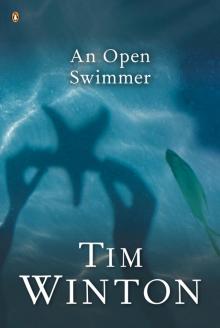 An Open Swimmer
An Open Swimmer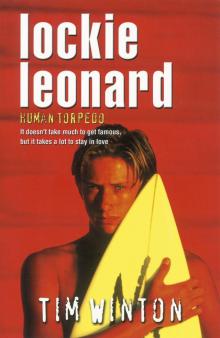 Human Torpedo
Human Torpedo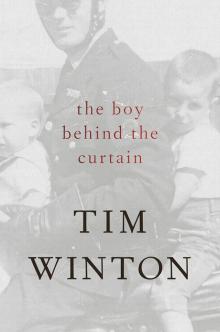 The Boy Behind the Curtain
The Boy Behind the Curtain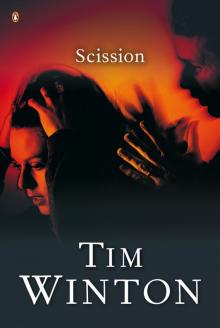 Scission
Scission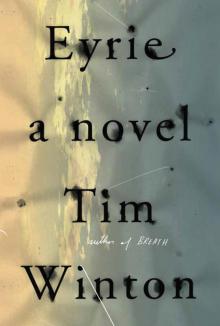 Eyrie
Eyrie Island Home
Island Home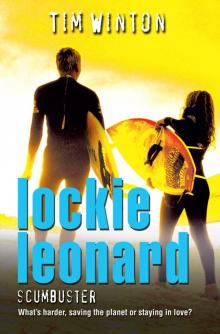 Scumbuster
Scumbuster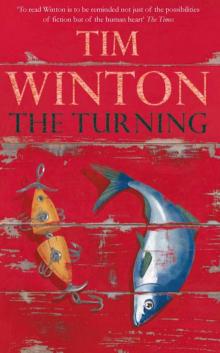 The Turning
The Turning Legend
Legend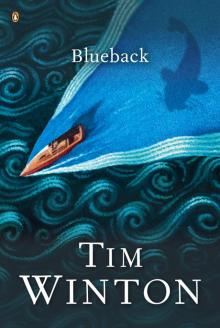 Blueback
Blueback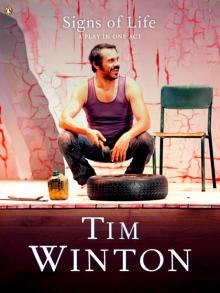 Signs of Life
Signs of Life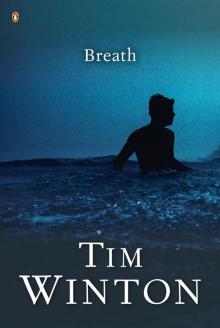 Breath
Breath Land's Edge
Land's Edge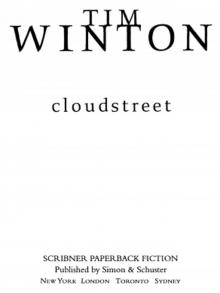 Cloudstreet
Cloudstreet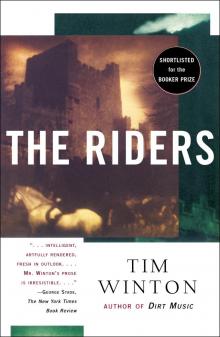 The Riders
The Riders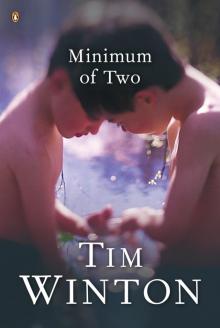 Minimum of Two
Minimum of Two Shallows
Shallows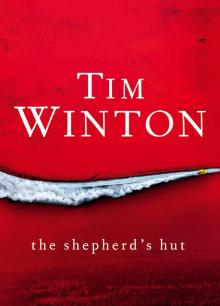 The Shepherd's Hut
The Shepherd's Hut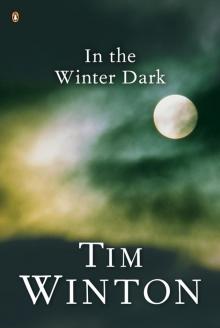 In the Winter Dark
In the Winter Dark